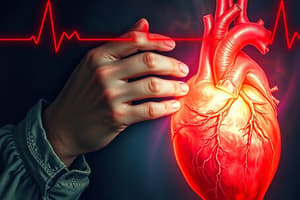Podcast
Questions and Answers
What is the main purpose of administering Morphine Sulfate in the treatment of pulmonary edema?
What is the main purpose of administering Morphine Sulfate in the treatment of pulmonary edema?
- To induce vasoconstriction
- To reduce blood pressure significantly
- To slow down heart rate
- To decrease anxiety and improve oxygenation (correct)
What position should a patient with pulmonary edema be placed in to promote lung expansion?
What position should a patient with pulmonary edema be placed in to promote lung expansion?
- Lateral position
- High Fowler's position (correct)
- Supine position
- Prone position
Which medication would be given to help reduce excess fluids in a patient with pulmonary edema?
Which medication would be given to help reduce excess fluids in a patient with pulmonary edema?
- Vasodilators
- Diuretics (correct)
- Inotropic agents
- Morphine Sulfate
Why is monitoring intake and output important in the management of pulmonary edema?
Why is monitoring intake and output important in the management of pulmonary edema?
What should be monitored due to the administration of diuretics in patients with pulmonary edema?
What should be monitored due to the administration of diuretics in patients with pulmonary edema?
What does heart failure primarily indicate about the heart's function?
What does heart failure primarily indicate about the heart's function?
Which symptom is NOT commonly associated with heart failure?
Which symptom is NOT commonly associated with heart failure?
What role do catecholamines play in the context of heart failure?
What role do catecholamines play in the context of heart failure?
Which condition is considered a direct effect of heart disease contributing to heart failure?
Which condition is considered a direct effect of heart disease contributing to heart failure?
What is a primary characteristic of congestive heart failure (CHF)?
What is a primary characteristic of congestive heart failure (CHF)?
Which of the following conditions can increase cardiac workload, potentially leading to heart failure?
Which of the following conditions can increase cardiac workload, potentially leading to heart failure?
Which of the following describes a clinical manifestation of heart failure?
Which of the following describes a clinical manifestation of heart failure?
What aspect does not classify as a condition directly causing heart failure?
What aspect does not classify as a condition directly causing heart failure?
What is the primary goal of medical management in heart failure?
What is the primary goal of medical management in heart failure?
Which class of medications is used to increase cardiac efficiency in heart failure patients?
Which class of medications is used to increase cardiac efficiency in heart failure patients?
Which nursing intervention is most effective in managing pulmonary congestion?
Which nursing intervention is most effective in managing pulmonary congestion?
What symptom indicates a severe case of pulmonary edema?
What symptom indicates a severe case of pulmonary edema?
What is the purpose of elevating a heart failure patient's head of bed (HOB)?
What is the purpose of elevating a heart failure patient's head of bed (HOB)?
Which of the following is a common clinical manifestation of acute pulmonary edema?
Which of the following is a common clinical manifestation of acute pulmonary edema?
Which of the following treatments can aid in improving symptoms in patients with heart failure?
Which of the following treatments can aid in improving symptoms in patients with heart failure?
What is a primary consequence of left ventricular failure?
What is a primary consequence of left ventricular failure?
Which of the following is a common sign of right-sided heart failure?
Which of the following is a common sign of right-sided heart failure?
Which monitoring action is crucial for assessing worsening heart failure?
Which monitoring action is crucial for assessing worsening heart failure?
What should patients with heart failure be taught about their medication management?
What should patients with heart failure be taught about their medication management?
What physical assessment finding might indicate decreased renal perfusion in heart failure?
What physical assessment finding might indicate decreased renal perfusion in heart failure?
What is a significant risk factor for pulmonary edema associated with left-sided heart failure?
What is a significant risk factor for pulmonary edema associated with left-sided heart failure?
What would a chest X-ray likely show in a patient with heart failure?
What would a chest X-ray likely show in a patient with heart failure?
Which laboratory test specifically assesses cardiac function and may indicate the severity of heart failure?
Which laboratory test specifically assesses cardiac function and may indicate the severity of heart failure?
What is a characteristic symptom of pulmonary congestion due to left heart failure?
What is a characteristic symptom of pulmonary congestion due to left heart failure?
In right-sided heart failure, where is edema most likely to be observed?
In right-sided heart failure, where is edema most likely to be observed?
What is a potential consequence of untreated left ventricular failure?
What is a potential consequence of untreated left ventricular failure?
Which symptom is associated with impaired liver function due to heart failure?
Which symptom is associated with impaired liver function due to heart failure?
What symptom may indicate worsening heart failure in a patient?
What symptom may indicate worsening heart failure in a patient?
Which of the following conditions does NOT directly contribute to heart failure?
Which of the following conditions does NOT directly contribute to heart failure?
What is the most accurate definition of heart failure?
What is the most accurate definition of heart failure?
In which condition does pulmonary congestion primarily occur in heart failure?
In which condition does pulmonary congestion primarily occur in heart failure?
Which symptom is commonly associated with decreased cardiac output in heart failure?
Which symptom is commonly associated with decreased cardiac output in heart failure?
Flashcards are hidden until you start studying
Study Notes
Heart Failure (Cardiac Insufficiency)
- Definition: Heart failure is a condition where the heart is unable to pump sufficient blood to meet the body's metabolic needs, causing circulatory congestion.
- Impact: Can affect either or both sides of the heart, leading to pulmonary and peripheral edema, fatigue, and shortness of breath.
- Etiology: Involves multiple causes, including congenital defects, diseases affecting the cardiovascular system (e.g., atherosclerosis, myocardial infarction, hypertension), and conditions that increase cardiac workload (e.g., infection, hyperthyroidism).
Clinical Manifestations
- Symptoms include decreased cardiac output, fatigue, anginal pain, anxiety, oliguria, and weight gain.
- Left Ventricular Failure: Characterized by an inability to pump oxygenated blood effectively, leading to symptoms such as pulmonary congestion, orthopnea, and dyspnea on exertion.
- Right Ventricular Failure: Associated with fluid accumulation in the body, often presenting as dependent edema, weight gain, and abdominal distension.
Assessment
- Subjective Data: Focus on symptoms like activity intolerance, edema, and how heart failure impacts daily living.
- Objective Data: Assess for signs of decreased renal perfusion (e.g., oliguria), peripheral and gastrointestinal congestion, and jugular vein distension.
Diagnosis of Congestive Heart Failure
- Diagnosis includes physical examinations, chest X-rays (showing heart enlargement and fluid), ECG (to rule out myocardial infarction), and echocardiography (to assess cardiac function).
- Lab tests: Elevated BNP indicates heart failure severity; serum electrolytes and kidney function tests help assess overall health.
Medical Management
- Goals include reducing heart workload and improving pumping ability.
- Drug therapy modifications include medications like digoxin and diuretics to enhance cardiac output and manage congestion.
- Lifestyle modifications involve dietary changes (e.g., low sodium) and fluid restrictions.
Nursing Interventions
- Monitor vital signs for signs of pulmonary edema (e.g., crackles, cough, oxygen saturation).
- Assess and address fluid retention through daily weights and abdominal girth measurements; elevate patient’s legs to reduce edema.
- Provide emotional support, education on medication adherence, and dietary restrictions to enhance patient knowledge and coping.
Pulmonary Edema
- Definition: Accumulation of extravascular fluid in the lungs, primarily caused by left-sided heart failure.
- Pathophysiology: Fluid buildup decreases gas exchange efficiency in the lungs, leading to severe respiratory distress.
Clinical Manifestations
- Symptoms include severe dyspnea, pink frothy sputum, and signs of agitation and restlessness.
- Objective findings may include tachypnea, tachycardia, and audible wheezes.
Assessment and Diagnostic Tests
- Diagnosis established through physical examination, chest X-ray, and arterial blood gas analysis to assess oxygenation and acid-base balance.
Medical Management of Pulmonary Edema
- Immediate treatment focuses on oxygenation, improving cardiac output, and reducing pulmonary congestion.
- Positioning: High Fowler's position promotes lung expansion and reduces venous return.
- Medication: Morphine sulfate can alleviate anxiety and improve preload; diuretics manage fluid overload.
Nursing Priorities for Pulmonary Edema
- Interventions include administering supplemental oxygen and monitoring cardiac status (vital signs, lung sounds).
- Patient education emphasizes understanding of medications, recognizing worsening symptoms, and the importance of reporting any concerning changes.
Heart Failure (Cardiac Insufficiency)
- Definition: Heart failure is a condition where the heart is unable to pump sufficient blood to meet the body's metabolic needs, causing circulatory congestion.
- Impact: Can affect either or both sides of the heart, leading to pulmonary and peripheral edema, fatigue, and shortness of breath.
- Etiology: Involves multiple causes, including congenital defects, diseases affecting the cardiovascular system (e.g., atherosclerosis, myocardial infarction, hypertension), and conditions that increase cardiac workload (e.g., infection, hyperthyroidism).
Clinical Manifestations
- Symptoms include decreased cardiac output, fatigue, anginal pain, anxiety, oliguria, and weight gain.
- Left Ventricular Failure: Characterized by an inability to pump oxygenated blood effectively, leading to symptoms such as pulmonary congestion, orthopnea, and dyspnea on exertion.
- Right Ventricular Failure: Associated with fluid accumulation in the body, often presenting as dependent edema, weight gain, and abdominal distension.
Assessment
- Subjective Data: Focus on symptoms like activity intolerance, edema, and how heart failure impacts daily living.
- Objective Data: Assess for signs of decreased renal perfusion (e.g., oliguria), peripheral and gastrointestinal congestion, and jugular vein distension.
Diagnosis of Congestive Heart Failure
- Diagnosis includes physical examinations, chest X-rays (showing heart enlargement and fluid), ECG (to rule out myocardial infarction), and echocardiography (to assess cardiac function).
- Lab tests: Elevated BNP indicates heart failure severity; serum electrolytes and kidney function tests help assess overall health.
Medical Management
- Goals include reducing heart workload and improving pumping ability.
- Drug therapy modifications include medications like digoxin and diuretics to enhance cardiac output and manage congestion.
- Lifestyle modifications involve dietary changes (e.g., low sodium) and fluid restrictions.
Nursing Interventions
- Monitor vital signs for signs of pulmonary edema (e.g., crackles, cough, oxygen saturation).
- Assess and address fluid retention through daily weights and abdominal girth measurements; elevate patient’s legs to reduce edema.
- Provide emotional support, education on medication adherence, and dietary restrictions to enhance patient knowledge and coping.
Pulmonary Edema
- Definition: Accumulation of extravascular fluid in the lungs, primarily caused by left-sided heart failure.
- Pathophysiology: Fluid buildup decreases gas exchange efficiency in the lungs, leading to severe respiratory distress.
Clinical Manifestations
- Symptoms include severe dyspnea, pink frothy sputum, and signs of agitation and restlessness.
- Objective findings may include tachypnea, tachycardia, and audible wheezes.
Assessment and Diagnostic Tests
- Diagnosis established through physical examination, chest X-ray, and arterial blood gas analysis to assess oxygenation and acid-base balance.
Medical Management of Pulmonary Edema
- Immediate treatment focuses on oxygenation, improving cardiac output, and reducing pulmonary congestion.
- Positioning: High Fowler's position promotes lung expansion and reduces venous return.
- Medication: Morphine sulfate can alleviate anxiety and improve preload; diuretics manage fluid overload.
Nursing Priorities for Pulmonary Edema
- Interventions include administering supplemental oxygen and monitoring cardiac status (vital signs, lung sounds).
- Patient education emphasizes understanding of medications, recognizing worsening symptoms, and the importance of reporting any concerning changes.
Studying That Suits You
Use AI to generate personalized quizzes and flashcards to suit your learning preferences.




